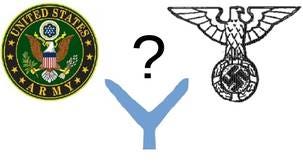The People vs. Donald J. Trump
In the court of boots on the pavement (but on the base or in the city?)
Today will be a departure from science and athletics, because political lightning-bolts are striking the country in a storm with heightened vigor, and we need to know what to do – now. There is no dearth of reporting, but competent and dispassionate analysis is in short supply. For that I have something to offer. As a former member of the national intelligence community, I have seen it done (even if only as a backoffice secretary).
Just over two months ago, the Trump regime had recently kidnaped a documented US resident off the streets, and then claimed a series of breathtaking lies for justification. Prior to that, there had been many plainly unconstitutional executive actions, but none that rose to the level of brass-knuckled street crime.
In the past week, we've seen the next step: the precursors to actual military dictatorship. Links to the reporting seem rather superfluous: everyone reading this knows that Trump ordered the California National Guard and the Marine Corp into action against the law. This was accompanied by Kristi Noem's threat (promise?) to take over complete political control of California.
I wrote previously that our best hope was in the courts, even the conservative-packed Supreme Court, with the proviso that we could not tell if court orders would be obeyed. While most of the many constitutional conflicts are still in litigation, we now see that the answer in at least some cases will be a definite “no.”
Prominent people have been warning of this for years: Timothy Snyder, Ruth Ben-Ghiat, and many others. However, the past week places us differently on the timeline. Snyder's Twenty Lessons are designed to help us avoid a coup, not to retake the country afterward (or even in the middle of it). But though we're on the verge of a coup, we won't wake up one morning, like the citizens of Chile did on 11 September 1973, to a fait accompli. Although there are multiple reasons, the most important is that the military high command did this in Chile, not an elected president. For us, like the Germans in 1933, there is a transition zone. It is when the military has united behind it that it becomes irreversible.
Snyder, among others, has underscored the fact that dictators have power only because the people allow it. But the “people's power” is what physicists call a collective property, and it cannot change from one state to another without cooperative interaction between many members (think how much humidity must be in the air before it rains). Even those many may not be enough if they are kept far enough apart.
Theoretically, courts can use US Marshals to enforce their orders. But such actions could be thwarted by the very Executive Department they would be targeting. More importantly, they are not strong enough to oppose troop deployments. Only those troops themselves can do that, which brings us to the critical issue of military command.
While members of the military probably trend toward politically conservative, a solid majority is unhappy with what Trump is doing. Yet if given orders, we must expect them to obey, because that is how the military collective property works. If you had been a soldier in Lt. William Calley's unit in Vietnam and he gave the order to “waste 'em,” that's what you would have done. Calley followed the same order from Capt. Ernest Medina. And it seems very likely that he was following the orders (or what he took to be orders) of his superior, Lt. Col. Frank Barker. This behavior is, indeed, not unexpected in view of prevailing law.
Yes, the military code also specifies that orders may be unlawful; and those should not, and indeed must not, be obeyed. However: it may not be evident in the heat of the moment whether an order is lawful or not, and the consequences of disobeying, if wrong, are potentially serious. Most troops, even officers, will act with caution – which means obedience. If the military is not to become the enforcer of political repression, the decision has to be made at the top, and not by only one person.
Military coups are not common in robust democracies, and we've been fortunate to see only one serious attempt. Military-led efforts to remove a dictator are even more rare, though one happened in Nazi Germany, no less. Of course neither the social nor political circumstances can be compared directly to ours, but it further illustrates the difficulty of bringing senior military officers together to disobey their commander-in-chief.
Much as I hope otherwise, as an analyst I'd peg the likelihood that we need that at greater than 50%. We've seen Trump's cabinet berated eloquently and vigorously in Congress – often. They aren't changing course; Noem made that clear enough. The several million protestors last Saturday were wonderful, but dictators don't need popular support. Nor should his increasingly unhinged mind matter. Others are ready to step in.
So, is there anything we can do?
There is. Without that top-brass support, the dictator can't dictate. And in the U.S., they've been steeped in a centuries-old culture of support for the Constitution. Remember the six-degrees-of-separation principle; it's probably fewer now. Whatever you can do to make your support known to the people who are going to matter most – do it. The army doesn't need to go to battle for us; it just has to not go to battle against us.
This Substack is free (though tips are welcome!) because I want the information to get out, and I want people to buy my novel, which is relevant and needed as never before. It's also good literature and a good read! Please check it out at https://www.bedazzledink.com/hannas-ascent.html#/.






I agree that we can't count on the courts. If for no other reason than that a court ruling (any ruling) relies on the certainty that it will be followed. One thing you didn't mention that I also see as problematic is the belief by many who enjoyed themselves this past weekend that we just need that magical 3.5%. That's not how it works either. Sometimes the hardest thing to do is to recognize that we actually CAN'T fix a situation in the given moment....
I don't know if there is anything we can do. Can it get worse? Will it help to vote in the midterm elections? The Supreme Court, Congress and The Senate could perhaps do something if they had the courage to act. Or maybe it's too late. If the dictator doesn't last very long due the obvious health issues; we will still have damage that can not be fixed. We may be heading for a war. I guess he doesn't understand that Iran and Russia have a good relationship. Russia has nuclear weapons.